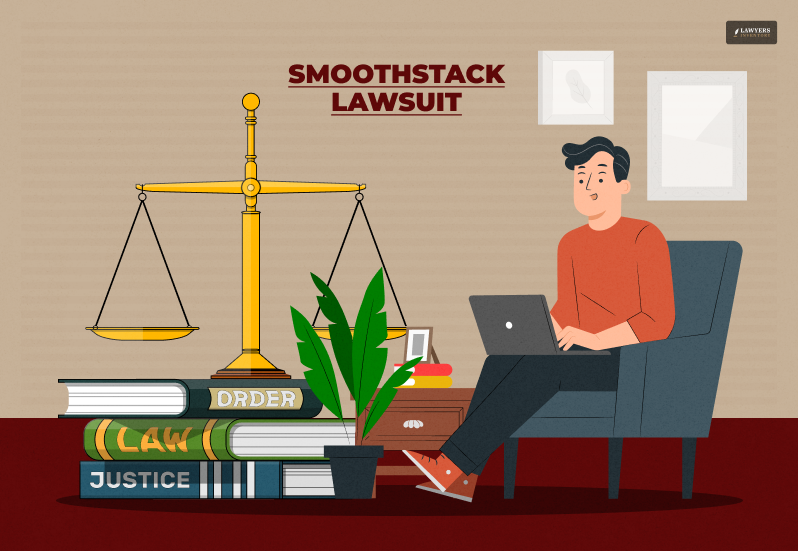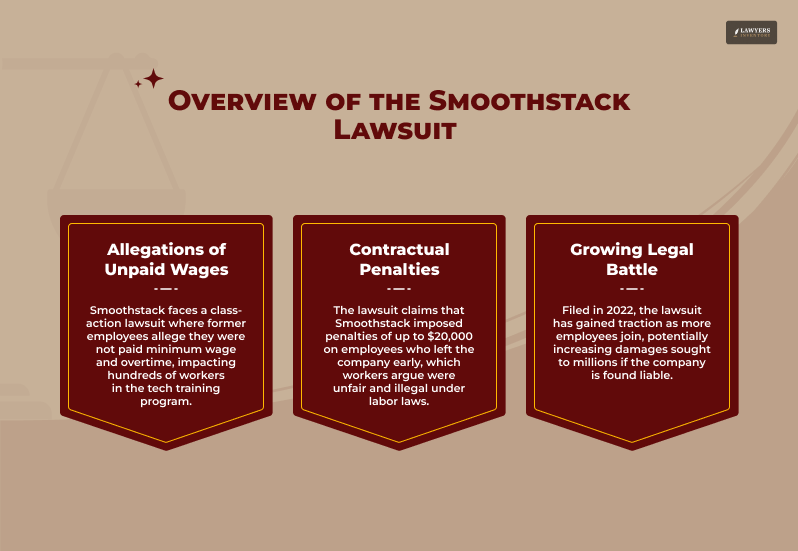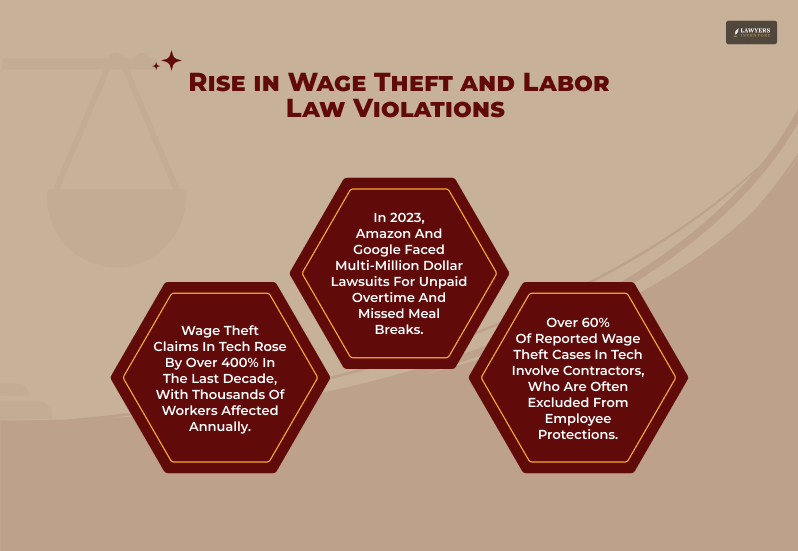
Today’s topic: Smoothstack Lawsuit!
Over the past few months, Smoothstack, which is known for providing new career paths in the IT field, has been negatively impacted by a class action lawsuit.
The allegations assert that Smoothstack dictates an illusory employment scheme that forces the workers to sign very strict Training Repayment Agreement Provisions (TRAPs).
According to Consumer Shield, Smoothstack uses a cheap labor pool to provide services for its highly profitable contracts, retaining half of its workers’ wages. “It controls how those workers are assigned to jobs, making it impossible for an energetic worker to work more hours to fulfill their obligation and end Smoothstack’s control.”
The provisions are such that if employees decide to quit the company before the contract expires, it will be very expensive for them, as penalties can sometimes exceed $23,000.
In this article, we will be breaking down the following things:
- What is Smoothstack?
- Major allegations in the Smoothstack lawsuit.
- How to protect yourself as a Smoothstack employee?
- Wage theft and labor law violations in the tech industry.
- Precedents and case studies of similar lawsuits.
Therefore, if these are a few things that you want to know, keep on reading this blog till the end…
Key Findings
- It is said that Smoothstack’s employee agreements include a Training Repayment Agreement Provision (TRAP) that stipulates that if an employee leaves before accumulating 4, 000 billable hours, they have to pay more than $23, 000, thus limiting their ability to look for other jobs.
- The suit alleges that Smoothstack infringed the Fair Labor Standards Act (FLSA) by not paying employees for their training and some employees being paid at minimum wage while their hours were longer, especially during client gaps.
- This lawsuit has attracted the attention of the Federal Trade Commission (FTC), which is investigating TRAPs like that of Smoothstack, which might be considered an unlawful way of restricting employees by imposing high fees or entering into restrictive agreements.
What Is Smoothstack: The Company Overview

Smoothstack is a tech staffing and training company specializing in launching careers for individuals in information technology. It primarily targets recent graduates and entry-level professionals who want to enter the tech industry but lack hands-on experience.
The company recruits candidates, places them into intensive training programs, and then deploys them as consultants with client companies.
This model allows Smoothstack to meet the needs of companies looking for IT talent. At the same time, it gives newcomers a structured pathway into the industry.
In April 2023, Smoothstack was hit with a class action lawsuit filed by former employee Justin O’Brien.
The suit brings serious allegations about Smoothstack’s employment practices, specifically targeting their use of Training Repayment Agreement Provisions (TRAPs).
According to the lawsuit, these agreements impose a financial penalty of over $23,000 on employees who leave before accumulating 4,000 billable hours. Thus, it effectively traps them in their roles.
This high fee has raised concerns about fairness. This is because it discourages employees from seeking other job opportunities that may better align with their career goals.
Additionally, the lawsuit claims that Smoothstack failed to pay employees properly during their initial training periods.
Major Allegations In The Smoothstack Lawsuit
According to court documents, plaintiffs allege that the company violated the Fair Labor Standards Act (FLSA) by not compensating them for their time spent training. Additionally, they only paid minimum wage during gaps between client placements, despite requiring employees to remain on standby.
These allegations have attracted regulatory attention, with the Federal Trade Commission (FTC) reviewing the fairness of TRAPs in employment contracts.
Smoothstack’s case highlights the potential risks of restrictive employment agreements. This is especially for those entering the tech field and looking for growth without financial penalties holding them back.
1. Unlawful Wage Scheme
The core allegation against Smoothstack involves claims of wage theft and labor law violations.
According to the plaintiffs, Smoothstack requires employees to work extensive training hours without fair compensation.
Employees often work long hours during the initial training period, which is unpaid or paid at a minimal rate. Once placed on assignments, employees may be paid only minimum wage during periods between client projects. This happens despite being on call for potential assignments.
These claims raise significant questions about compliance with the Fair Labor Standards Act (FLSA). This law sets standards for minimum wage, overtime pay, recordkeeping, and child labor for most U.S. employers.
2. Wage Theft
Employers are required to pay at least the federal minimum wage under the FLSA. Also, they need to give overtime pay at one and a half times the regular rate for the hours exceeding 40 per week.
If Smoothstack did not pay employees for the training hours, or if they paid only minimum wage without overtime during on, call periods, then these practices could be considered as wage theft.
Moreover, the plaintiffs claim that Smoothstack has violated the labor laws of different states. That may have more stringent requirements for wage payments, overtime, and employee classification.
In cases like this, wage theft may be hidden in several employee practices, such as:
- Unpaid Overtime: Failure to compensate workers for the extra hours they have worked beyond 40 hours per week.
- Minimum Wage Violations: Giving less money than the federal or state minimum wage to employees, particularly during compulsory training.
- Improper Deductions: Taking part of the employees’ wages for certain costs or not paying for the time when employees are on standby or waiting.
These actions lessen the money that workers deserve to get. Besides that, it puts them in a tough financial position, especially entry-level professionals who rely on regular pay.
In a case where Smoothstack does not meet the requirements of wage and hour laws, the company might be subjected to legal sanctions. For example, they could be ordered to pay fines, back wages, and damages to the affected employees.
3. Employment Contracts
The lawsuit also scrutinizes Smoothstack’s employment contracts, which include restrictive clauses that may limit employees’ freedom to pursue other opportunities.
Key issues within these contracts include Training Repayment Agreement Provisions (TRAPs), non-compete clauses, and non-disclosure agreements (NDAs). These can create barriers for employees if enforced too strictly.
Training Repayment Agreement Provisions (TRAPs)
One of the most contested elements in Smoothstack’s contracts is the TRAP. It requires employees to repay over $23,000 if they leave before completing 4,000 billable hours, usually over two years.
This fee is considered prohibitive, effectively binding employees to the company under threat of significant financial penalty. TRAPs are often challenged in court for being excessively punitive and restricting worker mobility. This is because they make leaving a role unaffordable.
Non-Compete Clauses
Many companies include non-compete clauses to protect proprietary information, yet these clauses can be problematic if they are too broad.
Smoothstack’s non-compete terms might prevent employees from working in similar roles at other companies for a period. Eventually, this can hinder their career advancement.
Some states, like California, prohibit or heavily restrict non-compete agreements, emphasizing that courts often deem overly broad non-competes unenforceable.
Non-Disclosure Agreements (NDAs) and Restrictive Covenants
NDAs are common in many industries to protect confidential information. However, overly broad NDAs and restrictive covenants can discourage employees from reporting legal violations or pursuing other career paths.
If an NDA prevents former employees from discussing unfair employment practices, it can serve as a tool for silence rather than legitimate business protection.
How to Protect Yourself as a Smoothstack Employee?

O’Brien and other plaintiffs allege several issues. For instance, unpaid wages during the initial weeks of training and long work hours with only minimum wage paid for 40 hours despite often working up to 80 hours weekly are a few of them.
Additionally, they were also accused of placing the employees on indefinite minimum-wage assignments between client projects.
If you are an employee working here or are facing similar issues at your workplace, there are a few things that you need to do to protect yourself and your rights as an employee:
- Document Everything: Keeping thorough records is your best line of defense. Track your work hours carefully, including start and end times, break periods, and any overtime worked.
- Consult With An Attorney: Employment laws can be complex, especially when dealing with non-compete agreements, wage claims, and restrictive clauses. Speaking with an attorney specializing in labor law can help you understand your rights and options.
- Join A Class Action Lawsuit: If there is an ongoing class action lawsuit against Smoothstack, be a part of it. Joining could provide a way to seek justice alongside other affected employees.
Wage Theft and Labor Law Violations in the Tech Industry

Wage theft and labor law violations have become alarmingly common in the tech industry. As companies rely heavily on contract and freelance labor to manage expenses, certain practices risk exploiting workers.
Data from the Economic Policy Institute shows that low-wage workers across many sectors lose an estimated $15 billion yearly to wage theft. This includes unpaid overtime, minimum wage violations, and wrongful deductions.
Although not all tech workers fall under “low-wage,” restrictive practices and misclassification issues still affect a significant portion of the workforce.
For instance, in a 2022 report, roughly 10% of tech professionals reported wage theft practices. This was often tied to unpaid overtime and deductions for training programs.
Some employees, hired as “independent contractors,” were denied benefits they’d typically receive as full-time staff. This helps in creating a loophole for companies to bypass legal obligations.
Restrictive covenants, such as non-compete and non-disclosure agreements, are common in tech employment contracts but can pose serious red flags.
Studies show that approximately 18% of U.S. employees are bound by non-compete clauses, even in cases where they may be legally unenforceable. These clauses can limit a worker’s future career mobility and bargaining power in tech.
Some contracts also include non-solicitation clauses, preventing employees from working with clients even after leaving the company.
When companies use overly broad or ambiguous terms in these agreements, it can create situations where employees feel trapped and unable to seek better opportunities without legal consequences.
Case Studies and Precedents: Similar Cases to the Smoothstack Lawsuit
People have sued tech companies and training programs for similar reasons to the Smoothstack lawsuit. Especially in areas such as employment contracts and wage practices.
One of the major cases is the one against Revature, a tech training and staffing company that, like Smoothstack, offers training programs with the promise of job placements in tech.
In recent lawsuits, ex-employees of Revature accused the company of imposing restrictive employment contracts on them. Among these restrictions were huge financial penalties for leaving the company before the expiration of the specified contract period.
The plaintiffs argued that these restrictions limited their career mobility. Additionally, as a result, they were forced to stay in low-paying jobs.
There is also an example of Infosys, a leading IT consulting company, which was accused of wage theft by paying foreign workers less than what was stipulated in the law.
This is also a potential issue in the case of Smoothstack. Infosys resolved the issue by settling the case. However, they agreed to reforms in their wage practices for employees based in the U.S.
Decisions made by courts in these cases elucidate that the main legal concern revolves around the conditions under which non-compete clauses and repayment agreements can be enforced.
Several states, for example, California, have declared non-compete clauses in employee contracts invalid on the grounds that they are too restrictive.
Future of Employment Contracts and Restrictive Clauses
The lawsuit aims to recover damages under the Fair Labor Standards Act (FLSA) due to alleged unpaid wages and illegal penalties that limit workers’ freedom to leave Smoothstack without incurring expensive fees.
In general, labor advocates have been questioning the use of such restrictive clauses as:
- TRAPs.
- Non-compete clauses.
- Broad NDAs.
This is because these can result in employees feeling trapped in a bad work environment.
Among others, the Federal Trade Commission (FTC) is a regulatory body that is becoming more and more concerned about such agreements. Especially when they have a significant negative impact on early-career professionals and make it difficult for them to find other jobs.
Therefore, the result of this lawsuit may be a judicial precedent limiting how restrictive such contracts can be and informing employees of their rights under labor laws.
If a person is thinking of working for a company that requires signing such agreements, this case should serve as a warning to them to carefully go through the contracts and ask for an explanation if there is a particular restrictive term they do not understand before putting their signature on it.
Read Also:
- Ozempic Lawsuit: Can You Get Justice in Healthcare?
- Kennedy Funding Lawsuit and the Exploitation of Arkansas Statute of Frauds
- 72 Sold Lawsuit Exposed the Deceptive Marketing Strategies of Real Estate Agents!












0 Reply
No comments yet.